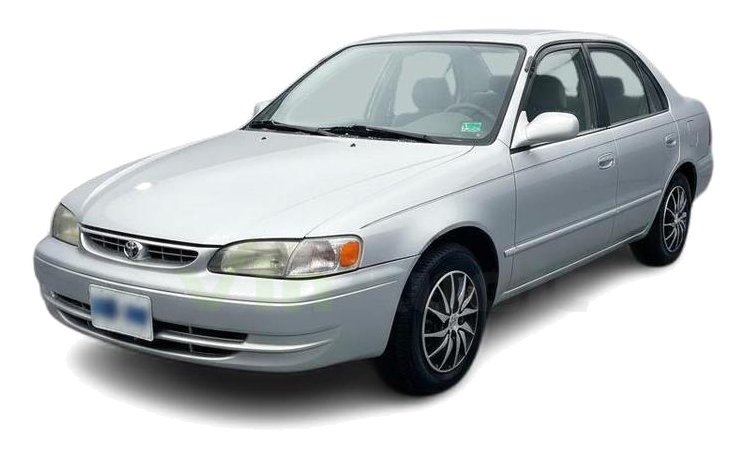The Good
The 1999 Toyota Corolla boasts exceptional reliability and impressive fuel efficiency, appealing strongly to practical buyers. Its simple design translates to ease of maintenance and long-term durability, ensuring a low cost of ownership. While not a performance powerhouse, it offers a smooth, comfortable ride suitable for daily commuting. Emotionally, owners appreciate its dependable nature and the peace of mind it provides, proving a trustworthy companion for years.
The Bad
While largely robust, the 1999 Toyota Corolla's known weaknesses include occasional issues with oxygen sensors and catalytic converters over time. Rust can be a concern, particularly in regions with harsh winters, affecting suspension components and body panels. The cabin's interior materials, though durable, might show wear and tear, and road noise levels can be higher compared to more modern vehicles. The performance can feel adequate but uninspired for some drivers.
1999 Toyota Corolla: Quick Overview
- Engine Options: The 1999 Toyota Corolla primarily featured one engine option for the North American market: a 1.8-liter 4-cylinder DOHC (Dual Overhead Camshaft) engine, known as the 1ZZ-FE. This engine was celebrated for its balance of efficiency and reliability, a hallmark of Toyota's engineering during that era.
- Horsepower: This 1.8-liter engine produced approximately 120 horsepower at 5600 rpm and 122 lb-ft of torque at 4400 rpm. This output was sufficient for the Corolla's lightweight chassis, providing adequate power for city driving and highway cruising without being particularly sporty.
- Fuel Economy: Fuel economy was a significant strong point. Equipped with either the 5-speed manual or 4-speed automatic transmission, the 1999 Corolla typically achieved an EPA estimated 28-31 mpg city and 34-38 mpg highway. Manual transmission models often saw slightly better highway figures.
- 0-60 Times: While not designed for speed, the 1999 Corolla's 0-60 mph acceleration times were respectable for its class, generally ranging between 8.5 to 9.5 seconds, depending on the transmission and specific conditions.
- Towing Capacity: The 1999 Toyota Corolla was not rated for significant towing. Owner's manuals typically advised against towing, or listed a very minimal capacity (e.g., around 1000 lbs if properly equipped with a light trailer), making it unsuitable for anything beyond the lightest utility trailers.
- Trim-Level Features:
- CE (Classic Edition): This was the base model, offering essential features like air conditioning, power steering, a 4-speaker AM/FM stereo, and front airbags. It was designed for practicality and affordability.
- VE (Value Edition): Often a temporary trim, it usually added basic amenities over the CE, sometimes including intermittent wipers or body-colored bumpers.
- LE (Luxury Edition): The top trim level provided more comfort and convenience, adding features such as power windows, power door locks, power mirrors, cruise control, a tachometer, and upgraded cloth upholstery. Optional features for the LE included an anti-lock braking system (ABS) and a CD player.
1999 Toyota Corolla Specifications
Vehicle Information
| Year | 1999 |
| Make | Toyota |
| Model | Corolla |
| Trim | - |
| Style | - |
| Type | Wagon |
| Category | Compact Car |
Manufacturing Details
| Made In | Canada |
| Manufacturing City | CAMBRIDGE |
Dimensions
| Doors | 4-Door |
| Curb Weight | - |
| Gross Vehicle Weight Rating | - |
| Overall Height | - |
| Overall Length | - |
| Overall Width | - |
| Wheelbase Length | - |
| Standard Seating | - |
Engine & Performance
| Engine | 1ZZ-FE |
| Engine Size | 1.8L |
| Engine Cylinders | 4 |
| Transmission | unspecified |
| Transmission Type | - |
| Transmission Speeds | - |
| Drivetrain | Front-Wheel Drive |
Additional Features
| Anti-Brake System | - |
| Steering Type | - |
Pricing
| Manufacturer Suggested Retail Price (MSRP) | - |
| Invoice Price | - |
| Delivery Charges | - |
Vehicle History Report
Specifications
History
Events
History Check
Check
Check
Check
Check
Listings
Recalls
Check
Analysis
What Problems Does the 1999 Toyota Corolla Have?
Regarding the 1ZZ-FE engine in some models around this timeframe, there were reports of excessive oil consumption due to piston ring design flaws. While more prevalent in later model years (early 2000s), it's worth monitoring oil levels diligently in a 1999 model. Rust is another significant long-term concern, especially in areas where road salt is used. This can affect body panels, subframes, and suspension components, potentially leading to structural integrity issues if severe.
Regarding recalls, the 1999 Corolla had several minor ones. For instance, there were recalls for issues related to the front passenger airbag inflator (part of the larger Takata airbag recall, affecting many manufacturers), requiring replacement. Other recalls included minor issues like improper label installation for tire and loading information, or issues with specific accessory installations. It's crucial for prospective buyers to check if all recall campaigns have been addressed for any specific vehicle. Overall, despite these points, the 1999 Corolla's long-term reliability remains outstanding, with many examples exceeding 200,000 or even 300,000 miles with proper maintenance.
How long will the 1999 Toyota Corolla last?
Its long-term durability is a major selling point, with the engine and transmission being particularly robust. However, weaknesses over time tend to be related to peripheral components like suspension bushings, motor mounts, exhaust systems (especially catalytic converters), and power steering components. Rust also becomes a significant factor in its lifespan, particularly in northern climates, often being the ultimate reason for a vehicle's retirement rather than mechanical failure of the powertrain.
What Technology & Safety Features are Included?
Driver-assistance features were minimal, primarily consisting of power steering and, on higher trims, cruise control. There were no advanced systems like blind-spot monitoring, lane-keeping assist, or adaptive cruise control. Safety features, while rudimentary by today's standards, were decent for its time. Dual front airbags (for driver and passenger) were standard across all trims. An Anti-lock Braking System (ABS) was an available option, particularly on the LE trim, providing enhanced stopping control under hard braking. Side airbags were not available.
Regarding crash-test ratings, the 1999 Corolla generally performed adequately in tests conducted by agencies like the National Highway Traffic Safety Administration (NHTSA) and the Insurance Institute for Highway Safety (IIHS) for its era. For frontal impact tests, it typically received 4 out of 5 stars from NHTSA for both driver and passenger. Side-impact tests, where available (often without side airbags, which were not common then), would show more moderate results. The IIHS rated the 1999 Corolla as "Good" in its moderate overlap frontal test, which was commendable for a compact car of that period, reflecting its solid structural integrity. These ratings contributed to its reputation as a safe, reliable commuter car, especially considering the safety standards of the late 1990s.
What Colors Options are Available?
1999 Toyota Corolla Prices and Market Value
In today's used market, prices for a 1999 Corolla vary significantly based on condition, mileage, and region, but generally range from as low as $1,500 to $4,000 or occasionally higher for exceptionally well-maintained, low-mileage examples. Its depreciation has been extremely gradual for its age due to its legendary reliability and demand for affordable transportation. Factors affecting its resale value include the overall mechanical condition, presence of rust, service history, and interior/exterior wear. A clean title and consistent maintenance records significantly boost its value. Despite its age, it holds its value remarkably well compared to many contemporaries.
1999 Toyota Corolla Cost of Ownership
Repair costs are also low because major components are durable and known issues are generally manageable. For example, oxygen sensors are common, but not excessively expensive to replace. Long-term ownership costs are among the lowest in the automotive market, making it an ideal choice for budget-conscious drivers. It is definitely an economical vehicle to own and operate, a primary reason for its enduring popularity.
1999 Toyota Corolla Fuel Efficiency
1999 Toyota Corolla Safety Rating
NHTSA
1999 Toyota Corolla Insurance
reasonable repair costs.
How Does the 1999 Toyota Corolla Compare to Other Wagon?
In terms of performance, the Corolla (with its 120hp 1ZZ-FE engine) was competitive with the Civic (D-series engines, 106-127hp depending on trim) and slightly more powerful than the base Sentra (1.6L, 115hp) or Escort/Cavalier (around 110hp). However, it wasn't known for spirited driving like some Civic Si models. The Corolla prioritized smooth, quiet operation over aggressive handling.
Features across its trims were comparable, with all offering basic amenities like air conditioning and optional power features. The Corolla's interior, while durable, was often seen as more conservative than the Civic's. Safety features were similar, with dual airbags and optional ABS being common.
Where the Corolla truly excelled was reliability. While the Honda Civic was also a paragon of dependability, the Corolla often edged it out in overall long-term robustness and fewer reported common issues, especially concerning engine longevity without major oil consumption woes (though some 1ZZ-FE engines had later issues, the 1999 model was generally very solid). The Nissan Sentra was a close third, but the domestic rivals like the Escort and Cavalier generally lagged significantly in long-term reliability and build quality, often suffering from more frequent and severe mechanical and electrical problems.
In terms of price, new Corollas were competitively priced with the Civic and Sentra. On the used market, the Corolla and Civic command the highest resale values among their peers due to their strong reliability reputations.
Recommendations: If maximum long-term reliability and minimal ownership costs are the priority, the 1999 Toyota Corolla remains an excellent choice, perhaps only matched by the Honda Civic. For those seeking slightly more engaging driving dynamics, a Honda Civic might be a better alternative. The Nissan Sentra (particularly SE-R models for performance) could also be considered for a balanced alternative, though its long-term reliability might not quite match Toyota or Honda.
Final Verdict: Is the 1999 Toyota Corolla a Good Wagon?
It is absolutely worth buying in the used market, provided it has been reasonably well-maintained and shows minimal signs of severe rust. Buyers should look for models with a documented service history, specifically checking for regular oil changes and any indications of major repairs. While specific trims like the LE offer more creature comforts (power windows, cruise control), even the base CE trim delivers the core Corolla experience of reliability and efficiency. It is not for those seeking performance, cutting-edge technology, or luxury, but for pure, unadulterated practicality, the 1999 Corolla remains a top-tier choice.

